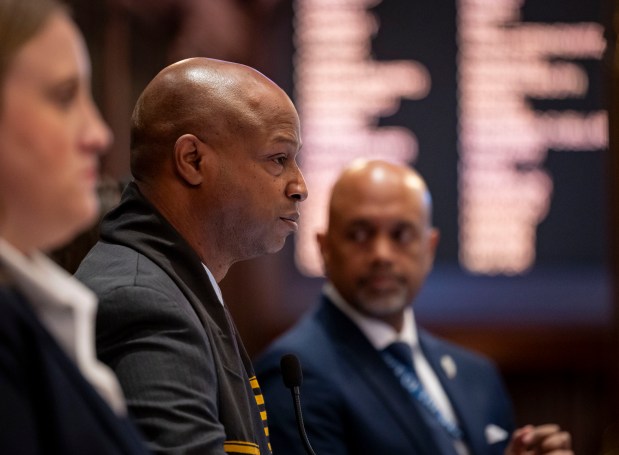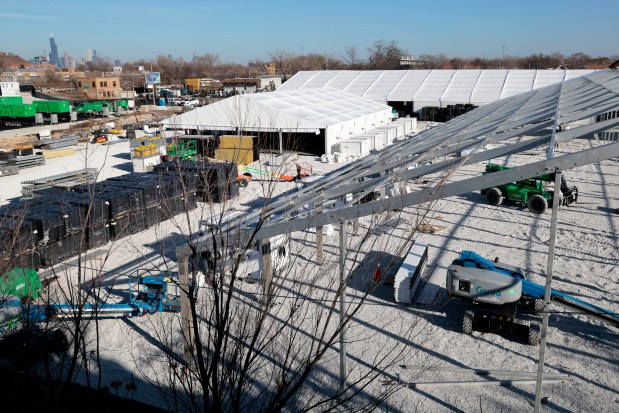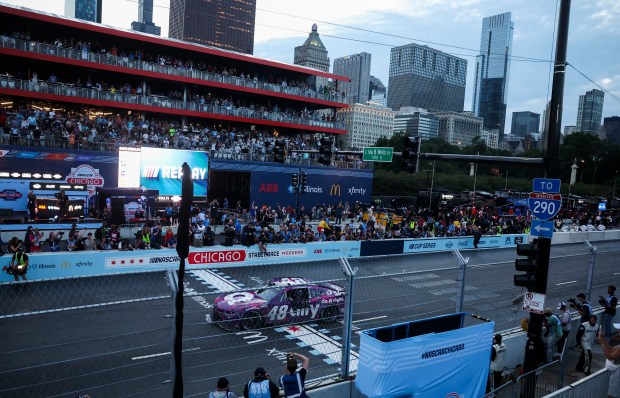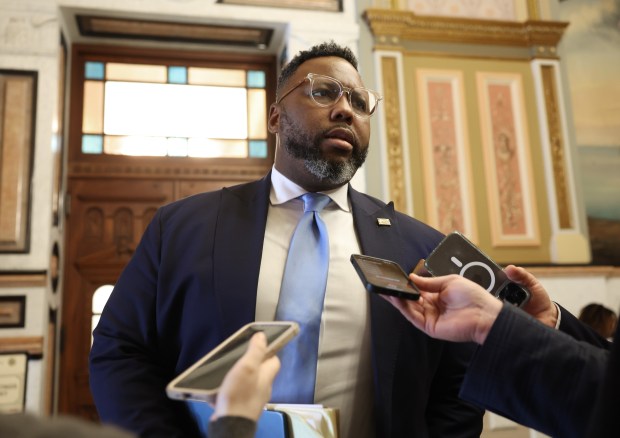Gov. JB Pritzker on Monday signed his seventh state budget, balanced as he promised with cuts, taxes and one-time revenue boosts but leaving for future months the battle over one major spending issue, an expected $771 million shortfall for Chicago-area transit systems.
Legislators adjourned their spring session without passing a transit plan, and Pritzker on Monday did his best to deflect responsibility for the problem, saying transit is “not a state budget issue… It’s really a separate matter entirely.”
“The answer is not that the state is solely responsible for filling that gap. There are lots of sources,” Pritzker said, ticking off Cook County, the collar counties, the city of Chicago, riders and changes within the systems as players in solving the problem. “Everybody’s focusing only on the state when actually there’s a whole lot to put together here.”
While it’s true that transit funding has been negotiated separately from the state’s operating budget throughout the year, state lawmakers have the ability to implement tax increases as possible funding solutions. Proposals to increase fees on ride-shares and deliveries failed to make it out of the General Assembly. State legislation would also be needed to reorganize the transit systems now under the Regional Transportation Agency.
The transit issue remains unaddressed at a time when federal funding remains uncertain as Republicans in Washington negotiate major budget cuts.
Democratic state Rep. Kam Buckner of Chicago, a lead budget negotiator in the House who has also been a leader in discussions on the transit issue, said legislators may have to convene in Springfield this summer if the federal cuts affect the state budget. If they do, they could take up the transit issue.
“We know that we’ve got a volatile federal government. Things are uncertain and unstable and there may be some things that trigger us to have to return back to that building and do work,” Buckner said. “And if we do, transit may be something that we also look at, which is why it’s important for us to have the conversations now and be ready for whatever next time it is that we make it back to that building.”
Pritzker has for months blamed Trump’s moves to dramatically decrease federal spending for some of the state’s budget woes, and at Monday’s signing ceremony the governor and other state leaders repeatedly drew a contrast between the state’s budget priorities and those of the Republican tax and spending bill in Washington.
“Despite all the uncertainty in these turbulent times facing the nation, Illinois’ fiscal year 2026 budget drives economic growth, it maintains the progress that we’ve made for working families and it continues our hard-earned fiscal responsibility,” Pritzker said.
The governor, a potential presidential candidate in 2028 who hasn’t yet announced whether he’ll run for reelection next year, also addressed Trump’s late Sunday order that directed U.S. Immigration and Customs Enforcement to prioritize deportations from cities run by Democrats, including Chicago.
Pritzker predicted Trump won’t try to deploy the National Guard to protect immigration agents and federal buildings in Chicago as he did in Los Angeles, saying the move was a political loser for the president. If Trump did try to deploy the Guard, Pritzker said, the state would rely on the courts to rein him in.
“But we know that ICE is coming once again in force to cities across the country, so we expect to see them once again in Chicago. I don’t know exactly how big the force will be,” Pritzker said.
The spending plan Pritzker signed makes nearly $400 million in spending cuts beyond what he proposed in February, budget negotiators said last month.
It increases taxes on tobacco products including vapes and nicotine pouches, online sportsbooks, and overseas and out-of-state corporate earnings. Combined with one-time revenue measures, the enhancements together total more than $800 million.
Republicans have said the level of tax increases and additional funding measures in the budget is unacceptable.
“This unprecedented tax-payer funded spending growth has included no meaningful tax relief for Illinois families and will continue to hold our state back,” Senate Republican leader John Curran of Downers Grove said Monday.
In response to the state’s transaction tax on online sports books, FanDuel operator Flutter announced plans last week to introduce a new 50 cent fee on each bet placed in Illinois. The state’s tax is 25 cents for the first 20 million wagers in licensed sportsbooks per year, then 50 cents for additional bets. FanDuel will remove the fee if Illinois drops the tax, the operator said.
Barring a decision to convene this summer, state lawmakers aren’t scheduled to return to Springfield until their annual fall session, when they could address the transit fiscal cliff. Depending on the outcome of the federal budget currently being negotiated by Republican lawmakers in Washington, Illinois legislators may also need to discuss changes in federal funding to the state or impacts to Illinoisans, such as potential cuts to Medicaid.
The budget package signed by Pritzker after passage by Democratic allies in the legislature included funding for a number of capital projects. Despite the fiscal challenges, the plan includes $8.2 billion in new spending on infrastructure projects, which are separate from the operating budget and funded by dedicated taxes and borrowing.
Republicans, none of whom voted for the budget package, again complained that they received nowhere near the money for large projects accorded their colleagues across the aisle.

Proviso Township High School District 209, which is in House Speaker Emanuel “Chris” Welch’s district and where he once served as school board president, is in line to receive $40 million for “costs associated with capital improvements and an outdoor sports complex at Proviso West High School,” whose alumni included the Hillside Democrat.
Welch defended the outlay, calling it “a regional project” that could not only benefit his constituents — many of whom live just west of Chicago’s city limits — but others in Cook County and further west into DuPage County.
“It’s going to be a major transformational economic development tool for that entire region. It’s going to help hotels. It’s going to help restaurants. It’s going to help communities build new housing because sports complexes drive economic development,” Welch said.
Another point of contention: an expected $1.3 million payment to a contractor for a migrant tent encampment in Chicago’s Brighton Park community that was never built. The appropriation was a result of a settlement between Pritzker’s Illinois Department of Human Services and contractor GardaWorld Federal Services, after Pritzker in 2023 halted construction on the project and made assurances that GardaWorld would foot the bill.
“When you consider the total amount that was being spent to prepare that site, that settlement seemed like as good a deal as we could get in a settlement agreement,” Pritzker said. His administration had pledged $65 million in tent encampment work, and in addition to what the state is now set to pay out, the city spent about $1.7 million on site remediation and a settlement with the Brighton Park property’s owner.

With a number of legal battles between the state and Trump administration ongoing, the budget boosts appropriations from the state’s general revenue fund for operations at Attorney General Kwame Raoul’s office by more than $15 million compared to last year, though the total funding from all sources to that office is expected to stay close to flat.
The budget also provides $118 million in grant funding for safety-net hospitals serving low-income patients and communities, less than the roughly $160 million some lawmakers were hoping for. It devotes $75 million to help ensure pensions for newer state employees meet a federal requirement that they are on par with Social Security benefits.
A line item for Stateville prison near Joliet, where the maximum security facility was emptied last year in preparation for an expected rebuild, dropped by more than $10 million from the governor’s proposal to $137 million in the budget he signed. Other prisons, including Sheridan, Pinckneyville and Menard correctional centers, as well as Logan women’s correctional center, saw their budgets tick slightly up compared to the February proposal.
The overall spending plan also cut back on various programs, including a politically polarizing initiative that provides Medicaid-style health insurance for noncitizens ages 42 to 64. That program was zeroed out, a savings the governor’s office estimated at $330 million, though the budget includes $110 million to continue coverage for those 65 and older.
Lawmakers also followed Pritzker’s recommendation to pause one of his key priorities: a $75 million annual increase to boost the number of seats in state-funded preschool programs. The budget would keep the spending level with the current fiscal year that ends at the end of the month.
Democrats also scaled back on the $350 million annual increase in school funding required under a 2017 state law, withholding $43 million that normally would go to a grant program designed to help school districts with high property tax rates and low real estate values.
NASCAR’s Chicago Street Race received a new $5 million allocation from the state’s general revenue fund for “costs associated with operating expenses.” The public expense to hold the race was a hot topic among Chicago aldermen after the city spent nearly $4 million on the inaugural 2023 race, but received just $620,000 in direct payments from the racing company.
The current budget has two grants for the organization, a spokesperson for the state Department of Commerce and Economic Opportunity said, covering $2 million for tire delivery, installation and removal of racecourse barriers, and other labor and staffing costs from the 2023 race. Another $5 million was set aside in “bonded capital,” including $2.5 million in process with DCEO for purchase and installation of the racecourse barriers, DCEO said. The other $2.5 million is unreleased.
A NASCAR spokesman said the association will submit expenses to DCEO for their review and approval after the end of this year’s race, July 5-6. The state has also spent advertising dollars at the “Enjoy Illinois 300” race in Madison and at NASCAR events at the Chicagoland race track in Joliet, NASCAR said.

Pritzker said he couldn’t speak to why $5 million was put in the budget for NASCAR but said the state’s tourism budget has increased in his 6 1/2 years as governor.
“Specifically, the investment in tourism yields revenue for the state that is vastly more than the investment that gets made by our tourism office,” he said. “So, I’m proud of the work that we’ve done. And we’re going to continue to make investments (there).”
Separately, Pritzker on Monday signed a one-year delay on the state’s novel and controversial law banning certain credit card fees on taxes and tips, which financial institutions are currently challenging in federal court. The provision was part of last year’s budget plan.



